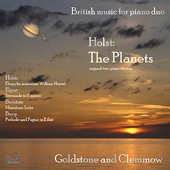
ESSENTIAL RECORDINGS

1} Edward Elgar - Serenade in E minor, Op. 20
2} Frank Bury - Prelude and Fugue in E flat major
3} Edgar Bainton - Miniature Suite
4} Gustav Holst - Elegy from Symphony in F "The Cotswolds"
5} Gustav Holst - The Planets (composer's original version for two pianos)
This is not a new release per se, but rather a reissue of recordings dating back to 1996, originally available on the Albany and Olympia labels. It's
certainly nice to see that it has been retrieved from the deletion bins and rescued from the jaws of oblivion. It is after all a wonderful recording of
piano rarities, expertly performed by Anthony Goldstone and Caroline Clemmow, a British piano duo that
owns this kind of music. The title of the CD is actually British music for piano duo but I thought I would focus attention on the "Planets",
not only because it's the main work on this disc, but also because it's such an amazing piece of music in its two piano version.
Gustav Holst's original two piano version of The Planets was in and of itself complete. The pictoresque,
evocative, symbolic and elemental essence behind the music was all there. All that the composer needed to do now was orchestrate it, and I think we
can all agree as to its standing as one of the orchestral masterpieces of all-time. But then, it was already a masterpiece in its original two piano version.
I always worry that because a piano is primarily a percussive instrument (hammers hitting strings), and depending on the performers, that the fluidity
and dynamic range of the orchestral effect would get lost in the changeover. Certainly not in this recording. Goldstone and Clemmow
have everything planned out so well, that the choice of instrument becomes irrelevant. Even Mars, The Bringer of War,
which in other versions for pipe organ, brass ensemble, etc ... never seems to come off properly, certainly is effective here. The accents, the dynamics,
the tempo, the precise war-machine like mechanism of the keyboards, it all works. The subtle nuances they bring to Venus, The Bringer
of Peace are perfectly judged. As you're listening, you forget that these are two pianos you're hearing. Mercury, The
Winged Messenger is swift, volatile, and that point at the end where the tiny planet quickly slips behind the sun is done extremely
well. Jupiter, The Bringer of Jollity is perfectly captured. They don't ham it up or exaggerate any of its features. Its
noble central march is regal and proud, and their coordination in the tempo changes and the fast passages is uncanny. Amazing finish. Even
Saturn, The Bringer of Old Age, the movement one would assume to be awkward and ponderous on the piano, is captivating.
Even the segment near the end, after death has come, and the music represents a wonderful combination of the soul rising up and the effortless spinning
of a gigantic planet against the darkness of deep space, is conveyed really well. The jaunty rhythm of Uranus, The Magician
is impressive, and Neptune, The Mystic, even without a string orchestra and ethereal female voices is well, mystic.
To avoid getting too long and to spare some binary bits, I will not go into any detail about the other pieces on this CD, except to say that they are all
wonderful little gems within the two piano repertoire, and act as great appetizers before the main course. If you are piano fans, Holst fans, Planets fans,
or Goldstone and Clemmow fans, and missed out on this recording in its original incarnations, don't make the same mistake twice. This is musicianship
at its best, in ear opening interpretations.
Jean-Yves Duperron - June 2012